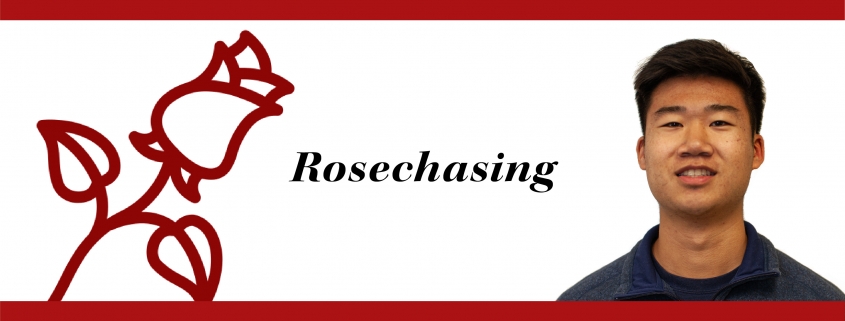Rosechasing: 2020 politics and reality TV are not so different
The race for the Democratic presidential nomination began with 28 candidates. Now, there are just eight. As 2020 speeds by, the Democrats should be starting to feel a sense of urgency to find the right candidate.
However, the path to the Democratic nomination has been a wild, confusing ride. The candidates have all competed in a closely contested battle, but the sheer number of people running and the wide range of views and ideas have resulted in a murky mess that might leave voters a bit conflicted or perplexed.
Let’s not forget all the drama and conflict that occurred this past year in the Democratic field either. Every year, the candidates have participated in a copious amount of mudslinging and squabbling.
All of this might seem strangely familiar. What show revolves around about 30 candidates, one goal and plenty of drama? I don’t know about you, but that sounds eerily similar to “The Bachelor” to me.
“The Bachelor” and the primaries have some eye-opening similarities that allude to a troubling fact: American politics today resembles a reality TV show where audiences don’t know what’s real or fake.
While this might appear to be a trivial comparison, it actually suggests that the presidential candidates are prone to acting like the contestants on “The Bachelor.” As we have all learned, contestants can be toxic and dramatic because of their situation — and based on my observations, the race for the nomination breeds the same kind of poisonous behavior.
Just as the set-up of “The Bachelor” pits women against each other and sends an anti-feminist message, the set-up of the presidential nomination pits candidates of the same party — who are supposed to share most beliefs — against each other, causing in-party hostility. As a result, the Democratic voting bloc stands divided and fails to unite behind one candidate.
For example, the rivalry between Sens. Bernie Sanders and Elizabeth Warren has escalated because of their competition in the Democratic field. They recently beefed after Warren claimed that, in 2018, Sanders said that the chance of a woman becoming president this year would be slim.
This conflict reminded me of “The Bachelor” incident when Kelsey accused Hannah Ann of stealing the champagne she had saved for Peter, and the two immediately engaged in an unpleasant conversation full of denial and disagreement.
The Democratic race also resembles “The Bachelor” through the theatrical staging of the debates. While they are meant for the voters to learn more about the candidates and what they stand for, they mostly turn into popularity contests with a lot of arguing and minimal attention to policy initiatives.
To me, debates don’t seem too different from group dates on “The Bachelor,” where several, but not all, of the candidates get a chance to show off to the audience. The contestants on “The Bachelor” and presidential candidates know how important those group dates and debates are. Thus, both groups are willing to do whatever it takes to stand out to the crowd, even when that comes at the expense of others.
For “Bachelor” contestants, that might take the form of cheating on an obstacle course like Kelley did to get alone time with Peter, leaving the other contestants who followed the rules in the dust. For the presidential candidates, it might come in the form of taking low blows at others and puffing up your own resume, just like when Sanders and former Vice President Joe Biden feuded over their Social Security policies after Sanders accused Biden of wanting to limit Social Security spending.
Indeed, politics has been overrun with distractions and is dominated by image and branding. Instead of focusing on what actually matters, American politics has turned into a massive circus where making your opponents look dumb takes priority over actually accomplishing things that make a difference. People talk about bipartisanship and reform, but right now, we are headed down a path of polarization. As a result, politics has taken on the look of a reality TV show, where politicians are irrational and emotional, leaving voters confused heading into the 2020 election.
Harrison Cho is a sophomore writing about “The Bachelor” and American pop culture. His column, “Rosechasing,” runs every other Friday.

